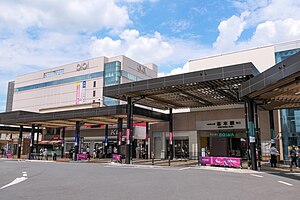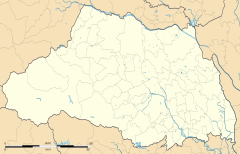Shiki Station (志木駅, Shiki-eki) is a passenger railway station located in the city of Niiza, Saitama, Japan, operated by the private railway operator Tobu Railway. Despite its name, the station building is not actually located in Shiki. The city of Shiki has only one station, Yanasegawa Station, which is the next stop after Shiki Station on the Tōbu Tōjō Line.
TJ14 Shiki Station 志木駅 | |||||||||||||||
|---|---|---|---|---|---|---|---|---|---|---|---|---|---|---|---|
 The south entrance in July 2021 | |||||||||||||||
| General information | |||||||||||||||
| Location | 2-38-1 Tōhoku, Niiza-shi, Saitama-ken 352-0001 Japan | ||||||||||||||
| Coordinates | 35°49′20″N 139°34′31″E / 35.822346°N 139.575237°E | ||||||||||||||
| Operated by | |||||||||||||||
| Line(s) | |||||||||||||||
| Distance | 17.8 km from Ikebukuro | ||||||||||||||
| Platforms | 2 island platforms | ||||||||||||||
| Tracks | 4 | ||||||||||||||
| Connections | Bus terminal | ||||||||||||||
| Other information | |||||||||||||||
| Station code | TJ-14 | ||||||||||||||
| Website | Official website | ||||||||||||||
| History | |||||||||||||||
| Opened | 1 May 1914 | ||||||||||||||
| Rebuilt | 1970 | ||||||||||||||
| Passengers | |||||||||||||||
| FY2019 | 104,698 daily | ||||||||||||||
| Services | |||||||||||||||
| |||||||||||||||
| |||||||||||||||
Lines
editShiki Station is served by the Tōbu Tōjō Line from Ikebukuro in Tokyo, with some services inter-running via the Tokyo Metro Yūrakuchō Line to Shin-Kiba and the Tokyo Metro Fukutoshin Line to Shibuya and onward via the Tōkyū Tōyoko Line and Minatomirai Line to Motomachi-Chūkagai. Located between Asakadai and Yanasegawa stations, it is 17.8 km from the Ikebukuro terminus.[1] All services except TJ Liner, Kawagoe Limited Express and Rapid Express[2] services stop at this station.[3]
Station layout
editThe station has two island platforms serving four tracks,[4] with the station building located above, and at a right angle to the platforms. There are two storage tracks adjacent to platform 1, and four storage tracks located between the running lines on the down (Kawagoe) side of the station, as well as a permanent way maintenance storage siding next to platform 4 at the south (Ikebukuro) end of the station.[4]
This station has a season ticket sales office.[5]
Platforms
edit| 1/2 | TJ Tōbu Tōjō Line | for Fujimino, Kawagoe, Shinrin-kōen, Ogawamachi, and Yorii |
| 3/4 | TJ Tōbu Tōjō Line | for Wakōshi, Narimasu, and Ikebukuro Y Tokyo Metro Yurakucho Line for Shin-Kiba F Tokyo Metro Fukutoshin Line for Shibuya TY Tōkyū Tōyoko Line for Yokohama SH Tōkyū Shin-Yokohama Line for Shin-Yokohama via Sōtetsu Shin-Yokohama Line for Ebina and Shōnandai Minatomirai Line for Motomachi-Chukagai |
-
The ticket barriers in July 2021
-
View from platforms 1/2 in July 2021
-
View from platforms 3/4 in July 2021
-
The view from the end of platform 3/4 in January 2016, showing the stabling sidings
History
editThe station opened on 1 May 1914 coinciding with the opening of the Tōjō Railway line from Ikebukuro.[6] At the time of its opening, the station was located in the town of Shiki (later becoming the city of Shiki).[7] In 1960, a new entrance was added on the south side of the station to improve accessibility for students of the Rikkyo High School (present-day Rikkyo Niiza Junior and Senior High School) which had recently relocated from Ikebukuro to Niiza, Saitama.[7] In 1970, to further improve access to the school, the station was moved closer to Ikebukuro, moving it across the boundary from the city of Shiki into Niiza.[7] While Niiza residents petitioned to have the station name changed, this never came about, and the name was used instead for Niiza Station on the Musashino Line, which opened in 1973.[7]
Through-running to and from Shibuya via the Tokyo Metro Fukutoshin Line commenced on 14 June 2008.[8]
From 17 March 2012, station numbering was introduced on the Tōbu Tōjō Line, with Shiki Station becoming "TJ-14".[9]
Through-running to and from Yokohama and Motomachi-Chūkagai via the Tōkyū Tōyoko Line and Minatomirai Line commenced on 16 March 2013.[10]
From March 2023, Shiki Station is no longer a Rapid Express service stop following the abolishment of the Rapid (快速, Kaisoku) services and reorganization of the Tōbu Tōjō Line services.[11] In addition, through service via the Tōkyū Shin-yokohama Line, Sōtetsu Shin-yokohama Line, Sōtetsu Main Line, and Sōtetsu Izumino Line to Shin-Yokohama, Ebina, and Shōnandai commenced.[12]
Future developments
editChest-high platform edge doors are scheduled to be added by the end of fiscal 2020.[13][needs update]
Passenger statistics
editIn fiscal 2019, the station was used by an average of 104,698 passengers daily.[14] Passenger figures for previous years (boarding passengers only) are as shown below.[15]
| Fiscal year | Daily average |
|---|---|
| 1950 | 3,380 |
| 1960 | 8,873 |
| 1970 | 36,254 |
| 1980 | 43,027 |
| 1990 | 50,064 |
| 2000 | 64,325 |
| 2010 | 68,421 |
Surrounding area
editBus services
editTobu Bus and Seibu Bus operate local bus services from the bus stops on either side of the station.[16][17]
Since 17 July 2008, there is a direct express bus service to and from Narita Airport (via Asakadai Station). The bus stop is on the south side of the station.[18]
See also
editReferences
edit- ^ Terada, Hirokazu (19 January 2013). データブック日本の私鉄 [Databook: Japan's Private Railways] (in Japanese). Japan: Neko Publishing. p. 224. ISBN 978-4-7770-1336-4.
- ^ Tobu Tojo Line Timetable, published March 2023
- ^ Tobu Tojo Line Timetable, published March 2019
- ^ a b Kawashima, Ryozo (February 2011). 日本の鉄道 中部ライン 全線・全駅・全配線 第11巻 埼玉南部・東京多摩北部 [Railways of Japan - Chubu Line - Lines/Stations/Track plans - Vol 11 Southern Saitama and Northern Tama Tokyo] (in Japanese). Japan: Kodansha. pp. 23, 62. ISBN 978-4-06-270071-9.
- ^ Tobu Tojo Line Timetable, published March 2016
- ^ Yamamoto, Tomoyuki (October 2008). "東武東上線の神話時代(1)". Japan Railfan Magazine. Vol. 48, no. 570. Japan: Koyusha Co. Ltd. pp. 126–131.
- ^ a b c d Takashima, Shuichi (November 2015). 東武沿線の不思議と謎 [Tobu Line Wonders and Mysteries] (in Japanese). Tokyo, Japan: Jitsugyo no Nihonsha Ltd. pp. 174–175. ISBN 978-4-408-11159-9.
- ^ Tobu Tojo Line Timetable, published 7 June 2008
- ^ 「東武スカイツリーライン」誕生! あわせて駅ナンバリングを導入し、よりわかりやすくご案内します [Tobu Sky Tree Line created! Station numbering to be introduced at same time] (PDF). Tobu News (in Japanese). Tobu Railway. 9 February 2012. Retrieved 21 March 2012.
- ^ Tobu Tojo Line Timetable, published March 2013
- ^ "東武東上線の快速列車が廃止に". Japan Railfan Magazine Online (in Japanese). Retrieved 18 March 2023.
- ^ "2023年3月18日(土)ダイヤ改正に係る各列車の時刻変更について" [March 18, 2023 (Saturday) Timetable change for each train due to timetable revision]. Tobu Railway. Archived from the original on 14 March 2023. Retrieved 28 May 2023.
羽沢横浜国大~新横浜~日吉駅間の開業に合わせ、東上線から日吉駅・新横浜駅を経由して海老名駅・湘南台駅までの直通運転を開始します。
[In conjunction with the opening of the Hazawa yokohama-kokudai - Shin-Yokohama - Hiyoshi line, we will start direct operation from the Tojo Line to Ebina Station and Shonandai Station via Hiyoshi Station and Shin-Yokohama Station.] - ^ 東武鉄道,ホームドアの設置を拡大 [Tobu Railway to expand platform door installation]. Japan Railfan Magazine Online (in Japanese). Japan: Koyusha Co., Ltd. 13 January 2017. Archived from the original on 13 January 2017. Retrieved 13 January 2017.
- ^ 駅情報(乗降人員) [Station information: Passenger figures] (in Japanese). Japan: Tobu Railway. 2021. Retrieved 5 January 2021.
- ^ Sawauchi, Kazuaki (October 2013). 東武鉄道東上線の歴史過程 [History of the Tobu Tojo Line]. The Railway Pictorial (in Japanese). 63 (880). Japan: Denkisha Kenkyūkai: 18.
- ^ 路線バス のりば案内 [Local bus stop guide]. Tobu Bus Online (in Japanese). Japan: Tobu Bus Co., Ltd. Retrieved 12 October 2012.
- ^ 志木駅南口 [Shiki Station South Exit]. Seibu Bus Timetable (in Japanese). Japan: Seibu Bus Co., Ltd. 1 April 2012. Archived from the original on 25 September 2009. Retrieved 12 October 2012.
- ^ "Fujimino, Niiza, Shiki, Asakadai - Narita Airport". Airport Transport Service Co., Ltd. Retrieved 8 October 2010.
External links
edit- Tobu station information (in Japanese)
- Shiki city history, including photograph of the station in 1914 (in Japanese)

